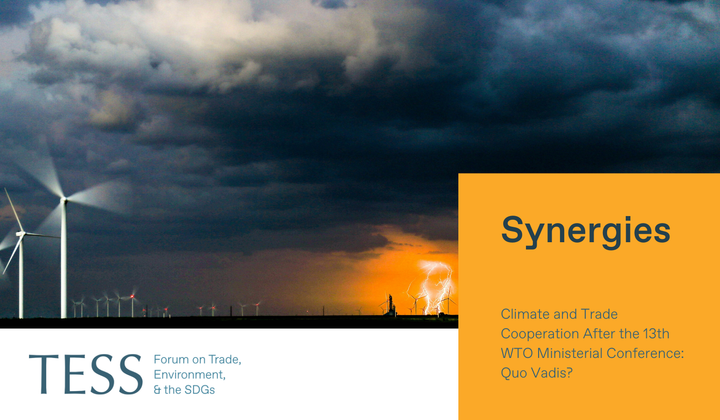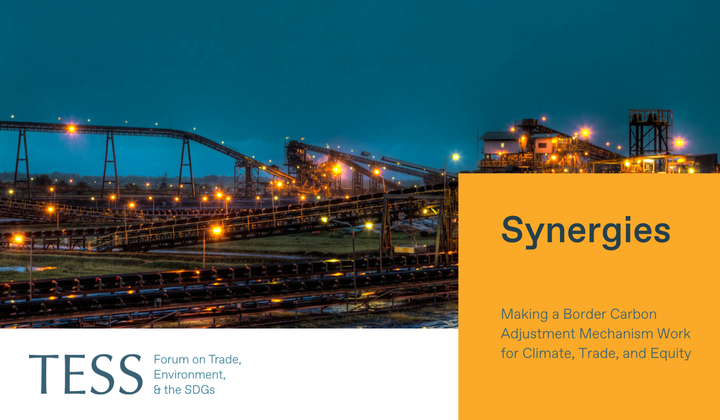To foster urgently needed multilateral cooperation and collective action on the nexus of trade, climate, and sustainable development at the WTO, members need to address the three core issues of trade-related carbon measures, subsidies, and trade facilitating action to support climate action in developing countries.
This article is part of a Synergies series on climate and trade curated by TESS titled Addressing the Climate Crisis and Supporting Climate-Resilient Development: Where Can the Trading System Contribute? Any views and opinions expressed are those of the author(s) and do not necessarily reflect those of TESS or any of its partner organizations or funders.
-----
Building on the growing engagement of World Trade Organization (WTO) members in discussions on trade, climate, and sustainability—and the broad recognition of the need to forge collaboration—a key question confronting the trade policy community is how to enhance international cooperation on trade at the WTO to drive action on the Paris climate goals in ways that support sustainable development priorities? Where are the greatest opportunities for trade cooperation to make a difference to climate action? What are the pragmatic options that could help shape a proactive, forward-looking agenda at the WTO between now and the next ministerial meeting in 2026?
Despite the disappointing outcome on issues of trade and sustainability, including on climate, at the WTO’s Thirteenth Ministerial Conference (MC13) earlier this year, it is possible to envisage a high level of ambition. So as to achieve this, it will be important to be pragmatic and use the great variety of tools available at the WTO. These include, for example, the option of pursuing both multilateral and plurilateral negotiations and of aiming for legally binding or non-legally binding outcomes. In using these tools, creativity will be key to developing a meaningful trade and climate agenda in the WTO.
This agenda will need to address three core issues at the interface between climate and trade: trade-related carbon measures, the impact of subsidies on both trade and climate, and trade facilitating measures in support of climate action by developing countries. On each of these key issues, what is achievable now within the framework of the WTO?
Creativity will be key to developing a meaningful trade and climate agenda in the WTO.
Trade-Related Carbon Measures
First, on trade-related carbon measures, it has been extremely useful to pursue intensive discussions in the Committee on Trade and Environment (CTE). This transparency function is going to continue to be critical going forward, as different policy developments are likely to take place in this space over the coming years. Yet while transparency is crucial, it will be necessary to go beyond this to limit the risks of fragmentation. In particular, it is disappointing that members so far have not agreed to conduct structured discussions in the CTE on the crucial issue of methodologies for carbon accounting. While an ideal scenario of agreeing to a common methodology for carbon accounting may or may not be attainable, at the very least we should aim for a situation where there is no incompatibility between the different methodologies that are being developed. Further discussion would also be useful on the issue of low carbon standards in different sectors and their potential interaction with trade-related carbon measures.
Alongside these discussions, the question of how to simplify the information that companies need to provide to meet carbon accounting requirements also needs to be on the table. Here, there are important decisions to make on verification systems and default values for example. As these issues will increasingly be worked out across many jurisdictions over the coming years, it is very important that this conversation also be conducted in a structured manner in the WTO.
Additionally, the WTO should continue to cooperate with other international organizations and keep WTO members informed on developments in climate policies that have an impact on trade, including possible initiatives on cooperation around carbon pricing or the development of sectoral decarbonization initiatives.
Subsidies
The second big challenge is subsidies, which need to be looked at from the point of view of their impact both on trade and climate. On this issue of subsidies—where a lot of thinking and work is being done—an off-campus analytical discussion should take place, drawing on the wealth of external expertise. This conversation cannot be conceived as a technical discussion in the Committee on Subsidies and Countervailing Measures but should be conducted instead from an analytical perspective in a more informal setting, bringing in as much expert knowledge as possible. A starting point could be to analyze different types of subsidies that are being used to support climate objectives both in terms of their effectiveness in achieving climate goals and their impacts on trade. This could include consumption subsidies, subsidies for research and development, and subsidies that cover capital investments or operating costs linked to the deployment of climate technologies. Only when sufficient analysis has been undertaken will it be possible to assess the appetite to negotiate the issue in the WTO. There would also be a need to consider the possible relationship between climate-related work on subsidies and broader efforts to update WTO rules on industrial and agricultural subsidies.
Trade Facilitating Action
The third issue relates to what can be done in the WTO to facilitate trade and investment in green goods and services. Here, an approach that is different to that taken in the Environmental Goods Agreement should be considered. This approach could be both narrower and broader: narrower in terms of the objective and broader in terms of the tools that could be utilized to achieve that objective. On the objective, it could be useful for interested WTO members to discuss how trade policy can facilitate climate action in developing countries. This has different dimensions, including issues related to facilitating investments in renewable energies, promoting better integration in green value chains (from critical raw materials to processing and manufacturing), or facilitating compliance with trade-related carbon measures. Participants could consider different trade-related actions that can contribute towards these objectives. Each participating member could identify those actions it is ready to undertake, and these measures could be put together in a plurilateral agreement that should be as inclusive as feasible as well as open for more countries to join. Work on this could start by COP30 in late 2025 with the aim to reach agreement by the WTO’s Cameroon ministerial conference (MC14) in 2026.
In Conclusion
Trade policy can make a significant contribution to the achievement of the goals of the Paris Agreement. By MC14, WTO members could aim at agreeing on a plurilateral initiative that provides for a set of trade-related actions to support developing countries in implementing their nationally determined contributions, promote their integration in green value chains (including through greater value addition), and facilitate compliance with trade-related climate measures. The CTE should have more focused discussions on trade related-climate measures with a view to promoting greater compatibility of approaches and limiting unnecessary costs for business due to fragmentation. Further, off-campus analytical work on subsidies from a trade and climate perspective would help to identify whether the issue is ripe for negotiations after MC14, possibly as part of broader work on both industrial and agriculture subsidies.
----------
Ignacio Garcia Bercero is former Director of Multilateral Affairs in DG Trade at the European Commission, nonresident fellow at Bruegel and member of the Friends of Multilateralism Group.
* This article is drawn from an intervention delivered on 9 September 2024 at the Opening Plenary of Geneva Trade Week on International Cooperation on Trade, Climate, and Sustainable Development at the WTO: Pragmatic Options & Unconventional Thinking. The event was hosted by TESS.
-----
Synergies by TESS is a blog dedicated to promoting inclusive policy dialogue at the intersection of trade, environment, and sustainable development, drawing on perspectives from a range of experts from around the globe. The editor is Fabrice Lehmann.
Disclaimer
Any views and opinions expressed on Synergies are those of the author(s) and do not necessarily reflect those of TESS or any of its partner organizations or funders.
License
All of the content on Synergies is licensed under a Creative Commons Attribution-NonCommercial-ShareAlike 4.0 International (CC BY-NC-SA 4.0)
license. This means you are welcome to adapt, copy, and share it on your
platforms with attribution to the source and author(s), but not for
commercial purposes. You must also share it under the same CC BY-NC-SA
4.0 license.
If you would like to reuse any material published here or if you have any other question related to Synergies, send an email to fabrice.lehmann@graduateinstitute.ch.




